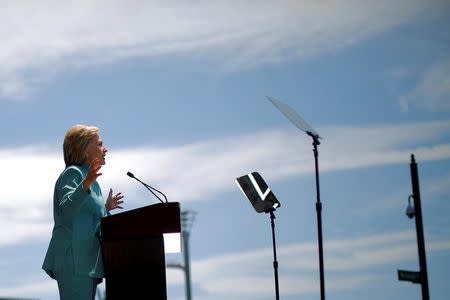U.S. House speaker formally asks that Clinton be denied classified data
By Julia Edwards and Alana Wise WASHINGTON (Reuters) - The top elected U.S. Republican formally asked the country's intelligence chief not to give Democratic presidential candidate Hillary Clinton any classified information during the election campaign, according to a letter released on Thursday. House of Representatives Speaker Paul Ryan said in the letter to Director of National Intelligence James Clapper that denying Clinton classified briefings during her run for the presidency would be an appropriate sanction for her improper handling of classified emails while secretary of state. Presidential candidates normally get access to classified information once they are formally nominated. The issue of Clinton's use of private email servers during her tenure as secretary of state has cast a cloud over her presidential campaign for the Nov. 8 election, raised questions among voters about her trustworthiness and given presidential rival Donald Trump an avenue of attack. Ryan's letter comes as congressional Republicans will get their first chance to grill FBI Director James Comey when he goes to Capitol Hill on Thursday to explain his decision not to recommend criminal charges against Clinton after a year-long investigation of her handling of classified emails while at state. Comey's testimony before the House Oversight Committee at 10 a.m. (1400 GMT) will be the first time he has taken questions publicly since his announcement this week that the FBI was not recommending charges against Clinton. U.S. Attorney General Loretta Lynch has accepted the FBI recommendation and will appear at a separate hearing next Tuesday. Comey said on Tuesday that 110 classified emails passed through Clinton's servers, which were not kept on a secure government server. He rebuked the presumptive Democratic presidential nominee for "extremely careless" handling of classified information but said no reasonable prosecutor would charge her or her staff criminally. The Clinton campaign said it was pleased at the FBI's announcement and called the Republican-led call for Comey's hearing a "taxpayer-funded sham of an inquiry" intended to hurt Clinton politically. The Oversight Committee is chaired by Republican U.S. Representative Jason Chaffetz, known for his persistent questioning of Obama administration officials. REPUTATION FOR INDEPENDENCE Comey, a Republican who was appointed by Democratic President Barack Obama and also served in the administration of former Republican President George W. Bush, has built a reputation as a straight shooter who does not bend to pressure from either party. He has differed sharply with the Obama administration, most recently over gun control and whether high-profile police brutality cases had inhibited law enforcement from stopping crime. Questions about the propriety of Clinton's use of unauthorized email servers in her Chappaqua, New York, home during her time as secretary of state from January 2009 until February 2013 have raised questions about her judgment from all sides of the political spectrum. Despite clinching the Democratic presidential nomination, Clinton can expect a further onslaught of attacks from Trump, the presumptive Republican presidential nominee, who has accused her of playing by a different set of rules from the American public. "Hillary Clinton can't keep her emails safe, and you know what, folks, she sure as hell can't keep our country safe," Trump told a recent rally in Raleigh, North Carolina, charging that the investigation was "rigged" in Clinton's favor. Comey left the door open for other actions in the case, including downgrading security clearances for anyone who mishandles classified information as Clinton and her staff did. (Additional reporting by Susan Cornwell and David Alexander; Editing by Peter Cooney and Bill Trott)



